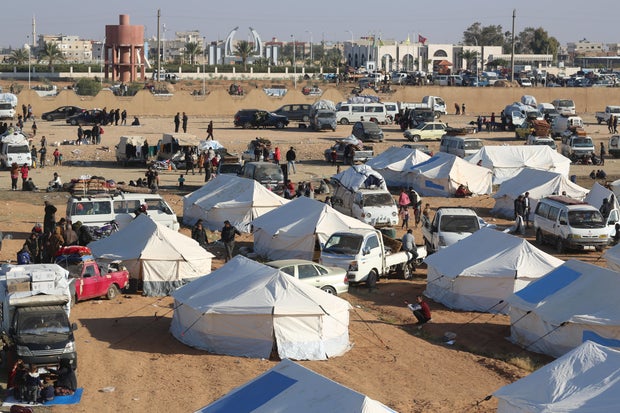Syrian rebel forces were approaching the country’s third largest city of Homs on Friday, a human rights group that monitors the war reported, raising the prospect of the country’s capital city Damascus being cut off from coastal areas that are a stronghold of President Bashar al-Assad.
The U.K.-based Syrian Observatory for Human Rights, which has relied on a network of sources on the ground to closely monitor the war since it started in 2011, said rebel forces had advanced to only about three miles from the city, and that regime soldiers had withdrawn from a number of nearby towns and villages in response to their advance.
SOHR said Assad’s forces had carried out airstrikes on water infrastructure in a nearby city and on a highway, but no casualties were reported.
What is happening with the war in Syria?
Thousands of people were fleeing from the area amid the dramatic escalation in the civil war, which had simmered without major advances by either side for years, until the rebels mounted a shock offensive about two weeks ago
The rebels took complete control of another city, Hama, and about a week after they began a sweeping raid across the north of the country. The first major prize in their offensive was seizing control of Aleppo a week ago, which was long Syria’s second most populous city.
Their sudden advance has taken many watching the long-simmering conflict by surprise, and SOHR says over 820 people have been killed since it started, including more than 100 civilians.
Syrian rebels say objective “remains the overthrow” of Assad
The war in Syria began in 2011 when a pro-democracy uprising calling for the end of Assad’s long reign escalated quickly into a brutal civil war. Since then, the conflict has killed more than 500,000 people and displaced some 12 million from their homes.
The war appeared to have stalled after Assad’s government regained control over many cities with the help of Russia and Iran, in addition to the powerful Iranian proxy group Hezbollah in Lebanon. Some northern and eastern areas of the country have remained under the control of Kurdish-led, U.S.-backed rebel groups. The current offensive, however, has been led largely by the militant group Hayat Tahrir al-Shams (HTS), which has tried to publicly distance itself from its jihadist roots as a regional branch of al Qaeda.
With other conflicts currently occupying Assad’s backers Iran, Russia and Hezbollah, the rebel forces are believed to have seen an opportunity to renew their fight against his army.
The leader of HTS told CNN in a recent interview that the goal of the offensive is to remove Assad from power.
“When we talk about objectives, the goal of the revolution remains the overthrow of this regime,” Abu Mohammad al-Jawlani told CNN. “The seeds of the regime’s defeat have always been within it… the Iranians attempted to revive the regime, buying it time, and later the Russians also tried to prop it up. But the truth remains: this regime is dead.”
Syrian rebel offensive worsens humanitarian crisis
Tens of thousands of civilians have fled the recent fighting, many of them heading to Raqqa province, which is held by the U.S.-backed Syrian Democratic Forces (SDF).
CBS News
Despite a deal to allow safe passage for those fleeing Aleppo province, SDF sources told CBS News that over 120 vehicles carrying hundreds of civilians were attacked by different Syrian Islamist groups on their journey. Local authorities say the humanitarian situation for those arriving in safe areas is dire.
Some 136 schools in Raqqa and 63 schools in the city of Tabqqa have been turned into makeshift shelters for IDPs. Raqqa Stadium, which was once used as a prison by ISIS militants when they controlled the territory, has also been turned into a camp to offer displaced civilians some shelter from the cold weather.
“The situation is catastrophic,” Zhwan Mullah, a member of the local crisis response team, told CBS News. “The number of IDPs is much larger than we can assist. U.N. and NGO support so far has been very insignificant.”
Saeed Muhammad Hassan, 53, fled to Raqqa from near Aleppo. On his way, he was separated from his wife, Sabah. Hassan, like an increasing number of civilians who’ve been separated from loved ones during their evacuation from areas hit by the fighting, approached local radio stations to put out an appeal to be reunited with Sabah.
“Many people are approaching us via different channels, looking for missing family members who have gone silent on the road to safety,” Sirwan Haji Birko, the head ARTA FM radio, told CBS News. “We try to help as much as we can to find missing ones, on radio and on our social media platforms.”

